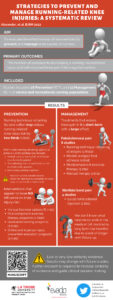Keywords: Running, Knee, Injury
Running is one of the most common activities world-wide, however it is associated with a high incidence of knee injury. This blog summarises our systematic review and meta-analysis findings related to the effectiveness of interventions to prevent and manage knee injuries in runners, published in the BJSM (1).
Why is the study important?
Unfortunately for runners who sustain a knee injury, their prognosis is often poor. Some runners require prolonged recovery periods, while others do not recover and may cease running, subsequently losing the associated health benefits. Our systematic review collated evidence for the prevention and management of running-related knee injuries from 30 studies, to guide clinical approaches and future research to reduce the risk of, and better manage thesee injuries.
How did the study go about this?
We conducted two separate searches (prevention and management) across 5 databases in May of 2022 to identify randomised controlled trials (RCTs) with a primary aim of evaluating the effectiveness of intervention(s) to prevent or manage running-related knee injury. Our primary outcomes included the number of participants developing a running-related knee injury (prevention) and self-reported knee pain following intervention (management).
What did the study find?
We identified 18 prevention and 12 management RCTs in novice and recreational running populations.
Prevention: Interventions evaluated included prescription of various running footwear options, multicomponent exercise therapy, variations on a graduated running program, online injury prevention education programs, running technique retraining, and an injury prevention education program (practical workshop). Running-related injury definition varied between studies, and the period of monitoring for injury ranged between 4 weeks and 12 months.
Key findings: Low-certainty evidence (1 trial, 320 participants) indicated that running technique retraining (cues to “land softer”) reduced running-related knee injury risk by two thirds compared to controlled treadmill running. Very low- to low-certainty evidence from all other prevention trials indicated that various footwear options, multicomponent exercise-therapy, graduated running programs, and injury prevention education programs, did not influence running-related knee injury risk.
Management: Eight trials investigated interventions to manage patellofemoral pain and four investigated interventions to manage iliotibial band pain. Patellofemoral pain interventions included running technique retraining, foot orthoses, minimalist running footwear, education, multicomponent exercise therapy, mindfulness, and osteopathic manipulation therapy. Iliotibial band pain interventions included shockwave therapy, manual therapy, multicomponent exercise therapy, injections, and medications. Follow-up periods ranged between 1 week and 7 months.
For patellofemoral pain, very low- to low-certainty evidence indicated that running technique retraining strategies, medial-wedged foot orthoses, multicomponent exercise-therapy and osteopathic manipulation can reduce pain in the short-term. For iliotibial band pain, very low-certainty evidence indicates that local corticosteroid injection decreases knee pain during a treadmill running test at 2-week follow-up compared to short-acting local anaesthetic injection.

Key clinical take homes:
Prevention
- Running technique retraining may reduce the risk of running-related knee injuries.
- No evidence supports implementing specific footwear prescription, multicomponent exercise therapy, graduated running programs, or injury prevention education programs to reduce the risk of running-related knee injury.
Management
- Exercise therapy, running technique retraining, prefabricated medial-wedged foot orthoses, and osteopathic manipulation may be considered to reduce running-related patellofemoral pain in the short-term.
- Local corticosteroid injection may reduce running-related iliotibial band pain in the short-term.
Further research is required to increase certainty of evidence and guide clinical decision making in the prevention and management of running-related knee injuries.
References:
- Alexander JLN, Culvenor AG, Johnston RRT, et al Strategies to prevent and manage running-related knee injuries: a systematic review of randomised controlled trials British Journal of Sports Medicine Published Online First: 23 September 2022. doi: 10.1136/bjsports-2022-105553